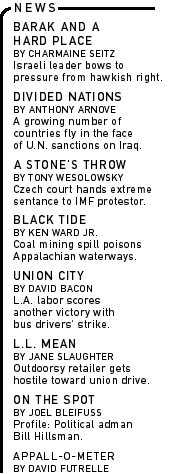
|

|

|

|

|
| |
 |
|
|
One year in prison for throwing a stone. That was the punishment meted out by a Prague court on November 4 to an 18-year-old Pole arrested during protests at the September meeting of the IMF and World Bank. Josef Lzicar, the Czech lawyer for the unidentified man, calls the ruling "repressive," saying the only evidence against his client was his own admission that he had thrown a rock during street clashes between anti-globalization demonstrators and police on September 26. But Lzicar says while the stone was hurled in the direction of hundreds of cops, "it's not even clear where it landed." The ruling comes as police in the Czech Republic face growing international scrutiny. Reports of brutality during the IMF-World Bank powwow are mounting: Some 320 complaints have been filed against the police, 11,000 of whom were called in from across the country to uphold order during the bankers' gathering. For the most part, Czech officials have shrugged off accusations of police wrongdoing. Interior Minister Stanislav Gross--whose job depended on the handling of security at the bankers' meeting--lauded police conduct, and Prague dished out monetary bonuses to officers who served during the demonstrations. One Czech legislator says the police should have opened fire on the demonstrators. Public sentiment also is decidedly against the protesters; this was stoked by media reports calling the protests "war" and harrowing images of people hurling rocks at police and breaking store windows. Polls show significant support for giving police rubber bullets at future demonstrations. Nevertheless, a special Interior Ministry inspection unit has been ordered to investigate police behavior. But it doesn't seem to be too interested in the task. Of the more than 320 complaints filed, the ministry is probing only four cases. One case involves Byengju Jeong, an assistant professor at Prague's Charles University, who found himself trapped between two police cordons on September 26. Jeong was detained for 24 hours. "Police screamed at us, beat us in the head, kicked us," he recounted to the Czech daily Mlada fronta Dnes. "I was hit 12 times. Using the toilet was a problem. I saw one of the detainees urinate in his pants. None of the police were wearing I.D. numbers." Jussi Hakkola, a demonstrator from Finland, was detained in a Prague jail, escorted to the Czech border, and barred from returning to the country for a year. "They started beating us in the police van," Hakkola says. "There was a bad interpreter, so the foreigners didn't know what was happening." Hundreds of observers tasked with monitoring the police had no idea where people were detained, let alone how they were treated in custody. "We had an agreement with the police that they would allow us in [the stations]," says attorney Oldrich Pospisil. "In reality, none of us had any idea where the demonstrators were taken." So far not one officer has been questioned or charged by the inspection
team, which has at its disposal scores of photos clearly showing
officers beating demonstrators. And judging by their record, no
officers will likely face disciplinary action. The Czech weekly
Tyden notes not one Czech police officer has ever been reprimanded
for excessive force during previous protests. |
